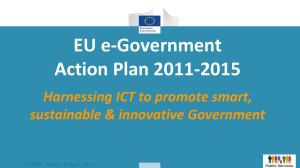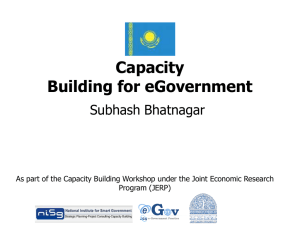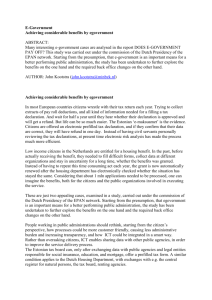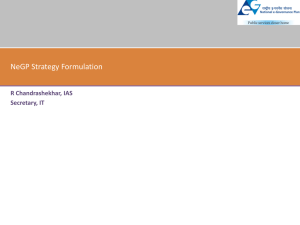Evidence-based eGovernment policies for advancing information technology infrastructure, governmental service delivery and accountability
advertisement
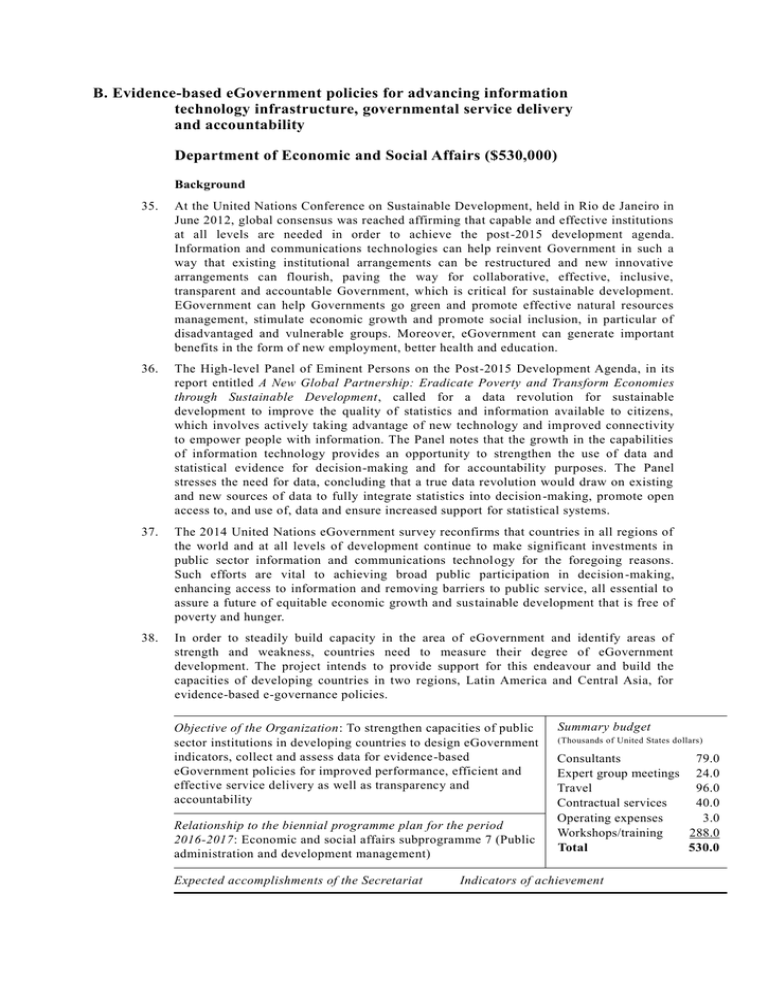
B. Evidence-based eGovernment policies for advancing information technology infrastructure, governmental service delivery and accountability Department of Economic and Social Affairs ($530,000) Background 35. At the United Nations Conference on Sustainable Development, held in Rio de Janeiro in June 2012, global consensus was reached affirming that capable and effective institutions at all levels are needed in order to achieve the post-2015 development agenda. Information and communications technologies can help reinvent Government in such a way that existing institutional arrangements can be restructured and new innovative arrangements can flourish, paving the way for collaborative, effective, inclusive, transparent and accountable Government, which is critical for sustainable development. EGovernment can help Governments go green and promote effective natural resources management, stimulate economic growth and promote social inclusion, in particular of disadvantaged and vulnerable groups. Moreover, eGovernment can generate important benefits in the form of new employment, better health and education. 36. The High-level Panel of Eminent Persons on the Post-2015 Development Agenda, in its report entitled A New Global Partnership: Eradicate Poverty and Transform Economies through Sustainable Development, called for a data revolution for sustainable development to improve the quality of statistics and information available to citizens, which involves actively taking advantage of new technology and improved connectivity to empower people with information. The Panel notes that the growth in the capabilities of information technology provides an opportunity to strengthen the use of data and statistical evidence for decision-making and for accountability purposes. The Panel stresses the need for data, concluding that a true data revolution would draw on existing and new sources of data to fully integrate statistics into decision -making, promote open access to, and use of, data and ensure increased support for statistical systems. 37. The 2014 United Nations eGovernment survey reconfirms that countries in all regions of the world and at all levels of development continue to make significant investments in public sector information and communications technology for the foregoing reasons. Such efforts are vital to achieving broad public participation in decision -making, enhancing access to information and removing barriers to public service, all essential to assure a future of equitable economic growth and sustainable development that is free of poverty and hunger. 38. In order to steadily build capacity in the area of eGovernment and identify areas of strength and weakness, countries need to measure their degree of eGovernment development. The project intends to provide support for this endeavour and build the capacities of developing countries in two regions, Latin America and Central Asia, for evidence-based e-governance policies. Objective of the Organization: To strengthen capacities of public sector institutions in developing countries to design eGovernment indicators, collect and assess data for evidence-based eGovernment policies for improved performance, efficient and effective service delivery as well as transparency and accountability Relationship to the biennial programme plan for the period 2016-2017: Economic and social affairs subprogramme 7 (Public administration and development management) Expected accomplishments of the Secretariat Summary budget (Thousands of United States dollars) Consultants 79.0 Expert group meetings 24.0 Travel 96.0 Contractual services 40.0 Operating expenses 3.0 Workshops/training 288.0 Total 530.0 Indicators of achievement (EA1) Strengthened capacity of countries in Latin America and Central Asia to measure their degree of eGovernment development in order to identify areas of strength and weakness (IA1.1) Increased number of public sector institutions in selected countries that defined and adopted their own eGovernment indicators (EA2) Strengthened institutional capacities of selected countries in these regions overcome the weaknesses defined above through the development of enhanced eGovernment policies (IA2.1) Increased number of measures taken in selected countries to adopt new policies in the area of eGovernment Main activities 39. The main activities of the project will include: (A1.1) Organize an expert group meeting on measuring the degree of eGovernment development and developing a methodological framework for an online toolkit with corresponding dataset requirements; (A1.2) Design a platform for sharing good practices and using the online toolkit; (A1.3) Organize and conduct two regional capacity-building workshops for chief information officers, permanent secretaries and/or key public administration officials and representatives of ministries responsible for public services on the ways to use the self-assessment toolkit. The workshops will be conducted, respectively, in two pilot developing countries in different regions, Latin America and Central Asia; (A1.4) Carry out assessment missions, as requested by countries that participated in the workshops, to provide assistance to relevant institutions in the development of national eGovernment indicators; (A2.1) Design and administer one online training course in support of the design and implementation of evidence-based eGovernment policies by using the selfassessment online toolkit; (A2.2) Organize and conduct two regional capacity-building workshops for chief information officers, permanent secretaries and/or key public administration officials and representatives of ministries responsible for public services in the pilot countries to help strengthen areas where weaknesses have been identified through the eGovernment self-assessment toolkit; (A2.3) Carry out technical advisory missions to assist with the definition of new eGovernment policies; (A2.4) Prepare a publication on lessons learned about evidence -based eGovernment policies for wider dissemination to other interested countries. [A/70/6 Sect. 35)] A: Programme for Statistics and Data Implementing entities: DESA, UNCTAD, ECA, ECE, ESCAP, ECLAC, ESCWA, ENEP, UN-Habitat and UNODC Duration: 2016 – 2019 Objective: To strengthen the statistical capacity of developing countries to measure, monitor and report on the SDGs in an accurate, reliable and timely manner for evidence based policy making Summary budget (Thousands of United States dollars) General temporary assistance 350.0 Consultants 3 000.0 Expert group 750.0 Travel 1 800.0 Contractual Services 700.0 Operating expenses 200.0 Seminars, Workshops3 200.0 Total 10 000.0 Detailed budget (US dollars) General Temporary Assistance Temporary assistance to assist with the implementation of the different programme components during peak loads; develop, coordinate and organize virtual training courses, in support of all activities (35wm x $10,000) Consultants International consultants $1,200,000 International consultants for the task(s) of preparing training materials, organizing workshops, preparing reports and providing advice to target countries in support of all activities (110 work months x $9,000) In support of the midterm evaluation of the project: 6wm x $15,000 = $90,000; In support of the final evaluation of the project: 8 work months x $15,000 = $120,000 National / Regional consultants $1,800,000 National/regional consultants for task(s) of preparing national case studies, training materials, holing national workshops, preparing reports and providing advice to national governments in support of all activities(300 work months x $6,000); Expert Group Fifteen Expert Group Meetings for the purpose of reviewing training materials, publications and providing inputs into methodologies in support of A2.3 and A3.2 (15 x $50,000) Travel of Staff Three hundred Missions by staff from all implementing entities for supporting all activities (300 x $6,000) Contractual Services For translation, interpretation, preparation of publications, printing, executing national components and hosting e-learning 350 000 3 000 000 750 000 1 800 000 700 000 3 [A/70/6 Sect. 35)] workshops in support of all activities Operating Expenses (a) Communications In support of all activities 200 000 (b) Other general operating expenses In support of all activities Seminars, Workshops and Study Tours Ten international workshops in support of A1.1, A2.7 and A3.6. (10 x $70,000) Forty Regional/subregional workshops, in support of A1.1, A2.7 and A3.6. (40 x $50,000) Fifty National workshops in support of A2.5 and A3.4 (50 x $10,000) 3 200 000 4

